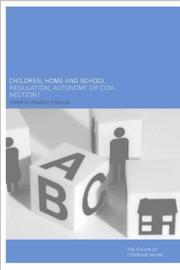| Listing 1 - 10 of 71 | << page >> |
Sort by
|
Book
ISBN: 2227025093 Year: 1974 Publisher: Paris : Le centurion,
Abstract | Keywords | Export | Availability | Bookmark
 Loading...
Loading...Choose an application
- Reference Manager
- EndNote
- RefWorks (Direct export to RefWorks)
Schools --- -Home and school --- -School and home --- Education --- Parent-teacher relationships --- Parents' and teachers' associations --- Public institutions --- Public schools --- Home and school --- School and home
Book
ISBN: 027300817X Year: 1975 Publisher: London Pitman
Abstract | Keywords | Export | Availability | Bookmark
 Loading...
Loading...Choose an application
- Reference Manager
- EndNote
- RefWorks (Direct export to RefWorks)
Home and school --- School and home --- School management --- Education --- Parent-teacher relationships --- Parents' and teachers' associations
Book
ISBN: 3518008307 Year: 1977 Volume: 830 Publisher: Frankfurt Suhrkamp
Abstract | Keywords | Export | Availability | Bookmark
 Loading...
Loading...Choose an application
- Reference Manager
- EndNote
- RefWorks (Direct export to RefWorks)
Home and school --- School and home --- Education --- Parent-teacher relationships --- Parents' and teachers' associations --- Home and school.
Book
ISBN: 058232470X Year: 1973 Publisher: London Longman
Abstract | Keywords | Export | Availability | Bookmark
 Loading...
Loading...Choose an application
- Reference Manager
- EndNote
- RefWorks (Direct export to RefWorks)
Home and school --- School and home --- Sociology of education --- Great Britain --- Education --- Parent-teacher relationships --- Parents' and teachers' associations
Book
ISBN: 1623963966 9781623963965 162396394X 9781623963941 9781623963958 1623963958 Year: 2013 Publisher: Charlotte, NC
Abstract | Keywords | Export | Availability | Bookmark
 Loading...
Loading...Choose an application
- Reference Manager
- EndNote
- RefWorks (Direct export to RefWorks)
Home and school. --- Educational psychology. --- Education --- Psychology --- School and home --- Parent-teacher relationships --- Parents' and teachers' associations
Book
ISBN: 2710103443 9782710103448 Year: 1981 Publisher: Paris
Abstract | Keywords | Export | Availability | Bookmark
 Loading...
Loading...Choose an application
- Reference Manager
- EndNote
- RefWorks (Direct export to RefWorks)
Sociology of education --- Home and school --- Famille et école --- School and home --- Education --- Parent-teacher relationships --- Parents' and teachers' associations --- Home and school. --- Famille et école
Book
ISBN: 0675083931 9780675083935 Year: 1978 Publisher: Columbus Merrill
Abstract | Keywords | Export | Availability | Bookmark
 Loading...
Loading...Choose an application
- Reference Manager
- EndNote
- RefWorks (Direct export to RefWorks)
School management --- Adult education. Lifelong learning --- Home and school --- Community and school --- School and home --- Education --- Parent-teacher relationships --- Parents' and teachers' associations --- School and community --- Schools

ISBN: 0415250447 Year: 2002 Publisher: London Routledge
Abstract | Keywords | Export | Availability | Bookmark
 Loading...
Loading...Choose an application
- Reference Manager
- EndNote
- RefWorks (Direct export to RefWorks)
Home and school --- Pedagogiek en onderwijskunde --- Didactische theorieën. --- #PBIB:2003.3 --- School and home --- Education --- Parent-teacher relationships --- Parents' and teachers' associations

ISBN: 0520914287 0585131473 9780520914285 9780585131474 0520083873 Year: 1991 Publisher: Berkeley : University of California Press,
Abstract | Keywords | Export | Availability | Bookmark
 Loading...
Loading...Choose an application
- Reference Manager
- EndNote
- RefWorks (Direct export to RefWorks)
Japanese two-year-olds are indulged, dependent, and undisciplined toddlers, but by the age of six they have become obedient, self-reliant, and cooperative students. When Lois Peak traveled to Japan in search of the "magical childrearing technique" behind this transformation, she discovered that the answer lies not in the family but in the preschool, where teachers gently train their pupils in proper group behavior. Using case studies drawn from two contrasting schools, Peak documents the important early stages of socialization in Japanese culture. Contrary to popular perceptions, Japanese preschools are play-centered environments that pay little attention to academic preparation. It is here that Japanese children learn their first lessons in group life. The primary goal of these cheerful--even boisterous--settings is not to teach academic facts of learning-readiness skills but to inculcate behavior and attitudes appropriate to life in public social situations. Peak compares the behavior considered permissible at home with that required of children at preschool, and argues that the teacher is expected to be the primary agent in the child's transition. Step by step, she brings the socialization process to life, through a skillful combination of classroom observations, interviews with mothers and teachers, transcripts of classroom events, and quotations from Japanese professional literature.
Education, Preschool --- Nursery schools --- Child rearing --- Home and school --- School and home --- Education --- Parent-teacher relationships --- Parents' and teachers' associations --- Schools --- Day care centers --- Kindergarten
Book
ISBN: 3261036974 9783261036971 Year: 1987 Publisher: Berne Lang
Abstract | Keywords | Export | Availability | Bookmark
 Loading...
Loading...Choose an application
- Reference Manager
- EndNote
- RefWorks (Direct export to RefWorks)
Parent-teacher relationships --- Relations parents-enseignants --- Home and school --- -Home and school --- -School and home --- Education --- Parents' and teachers' associations --- Parent and teacher --- Parents and teachers --- Teacher and parent --- Teacher-parent relationships --- Teachers and parents --- Interpersonal relations --- -Parent-teacher relationships --- School and home --- Parent-teacher relationships - Switzerland --- Home and school - Switzerland
| Listing 1 - 10 of 71 | << page >> |
Sort by
|

 Search
Search Feedback
Feedback About UniCat
About UniCat  Help
Help News
News